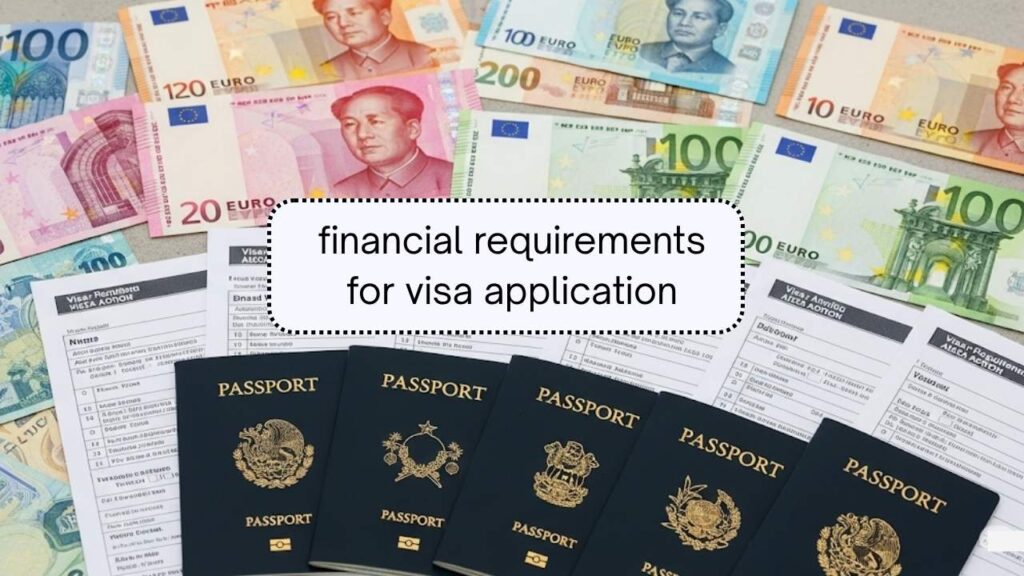financial requirements for visa application – Planning an international adventure, whether for study, work, or leisure, is an exhilarating prospect. However, the path to obtaining a visa can often feel like navigating a complex maze, especially with the ever-evolving financial requirements for visa applications. As a seasoned writer in this space, I’ve seen firsthand how crucial it is for aspiring travelers and migrants to be fully prepared on the financial front. My passion lies in demystifying these processes, offering actionable insights that empower you to successfully embark on your journey.

In 2024-2025, several popular destinations have introduced significant updates to their proof of funds stipulations, impacting applicants to the UK, Canada, Brazil, Thailand, and New Zealand. Staying ahead of these changes isn’t just about ticking boxes; it’s about ensuring your dreams don’t hit a financial roadblock.
financial requirements for visa application
| Country | Visa Type Impacted | Key Change (2024-2025) | Source |
| UK | Student, Work, Family | Increased living costs (£1,136-£1,483/month), higher skilled worker salary thresholds (£38,700), increased spouse visa income (£29,000). | GOV.UK, DAAD Scholarship, Gulbenkian Andonian Solicitors |
| Canada | Student (Study Permit) | Living expenses raised to CAD 20,635/year (plus tuition and travel). | Croyez Immigration, Ackah Law |
| Brazil | Tourist (select nationalities) | Visa requirement reintroduced for US, Canada, Australia; proof of USD $2,000+ required. | DAAD Scholarship, U.S. Embassy & Consulates in Brazil |
| Thailand | Tourist | Financial proof (THB 20,000 for solo, THB 40,000 for families) reintroduced. | The Economic Times, Times of India |
| New Zealand | Student, Investor | Student living costs: NZD 20,000/year; Investor Visa reduced to NZD $5 million. | MetaApply, Immigration New Zealand |
The landscape of financial requirements for visa applications is dynamic, reflecting global economic shifts and immigration priorities. While the updates for the UK, Canada, Brazil, Thailand, and New Zealand may seem daunting at first glance, they are ultimately designed to ensure that visitors and migrants are well-equipped for their new environments.
By understanding these changes, meticulously preparing your documents, and maintaining financial transparency, you significantly enhance your chances of a successful visa application. Remember, thorough preparation is not just a formality; it’s an investment in your future. Start preparing your financial documentation today, and take the confident first step towards your international aspirations!
Understanding the Financial Landscape for Your Visa Application
The core principle behind visa financial requirements is simple: countries want assurance that you can support yourself without becoming a public burden. However, the exact amounts and acceptable forms of proof vary significantly. Let’s delve into the specifics for each country.
United Kingdom: Navigating Stricter Financial Thresholds
The UK has consistently been a popular destination, and its financial requirements for visa applications have seen a notable uptick. For students, living cost estimates have risen, now standing at £1,483 per month for London and £1,136 per month for areas outside London (up to a maximum of 9 months). This is in addition to your course fees. Dependants accompanying students also require significant funds: £845 per month in London and £680 per month outside London, for up to 9 months.
For those considering the Skilled Worker visa, the minimum annual salary threshold has been increased to £38,700. This reflects a broader policy shift to prioritize higher-skilled roles. Family visas, particularly for spouses, have also seen a substantial rise in the minimum income threshold, now requiring £29,000 per year. I’ve seen many successful applicants focus on thoroughly documenting every income stream, from payslips to official letters from employers, to meet these more stringent criteria.
Acceptable forms of proof generally include bank statements, building society passbooks, certificates of deposit, or letters from your bank. It’s crucial that these funds have been held for at least 28 consecutive days, ending no more than 31 days before your application. Funds from overdrafts, cryptocurrency, stocks, shares, or pensions are typically not accepted.

Canada: Increased Living Expense Requirements for Students
Canada continues to attract international students with its world-class education system. However, for 2024-2025, the financial requirements for study permits have significantly increased. International students must now demonstrate access to at least CAD 20,635 for living expenses per year, in addition to their tuition fees and travel costs. This is almost double the previous requirement. If you plan to bring family members, additional funds are required: CAD 4,000 for a spouse and CAD 3,000 per child.
For Indian applicants, a Guaranteed Investment Certificate (GIC) of CAD 10,000 is still a mandatory component under the Student Direct Stream (SDS). Other acceptable proofs of funds include bank statements (showing a stable balance over several months, avoiding sudden large deposits), education loan approval letters, and scholarship letters. In my experience advising students, one common hurdle is failing to maintain consistent funds, which can lead to delays or even refusal. Always ensure your funds are traceable and have been in your account for a reasonable period.
Brazil: Reintroduction of Visa and Financial Proof for Select Nationalities
Brazil, known for its vibrant culture and stunning landscapes, has reintroduced visa requirements for citizens of the US, Canada, and Australia, effective April 10, 2025. This change means that travelers from these countries will now need to apply for an e-visa and provide proof of financial means. While a specific fixed amount might not be explicitly stated for all visa types, for tourist visas, applicants are now expected to show at least USD $2,000, along with submitting recent bank statements.
The purpose is to ensure visitors can cover their expenses during their stay, including accommodation, daily costs, and return travel. This marks a shift from previous visa-free arrangements for these nationalities. When preparing your application, be ready to provide bank statements for the last 6 months, income tax returns, and if employed, a letter from your employer confirming your designation and leave approval.

Thailand: Financial Proof Reinstated for Tourist Visas
Thailand, a perennially popular tourist destination, has also brought back its financial proof requirement for tourist visa applicants, effective May 2025. After a temporary suspension to boost post-pandemic tourism, visitors must now demonstrate financial solvency. This typically means showing THB 20,000 for solo travelers or THB 40,000 for families.
While this requirement is officially for tourist visa applicants, immigration officers at points of entry may also request proof of sufficient funds from those using the Visa on Arrival option. Acceptable documents include bank statements from the last three months or a sponsorship letter if someone else is financing your trip. This move highlights a renewed focus on ensuring visitors can comfortably support themselves during their stay.
“A well-prepared financial portfolio is your strongest advocate when applying for an international visa.” – Seasoned Immigration Advisor
New Zealand: Student and Investor Visa Updates
New Zealand, celebrated for its natural beauty and quality of life, has updated its financial requirements for both students and investors. For international students, the minimum living cost requirement is now NZD 20,000 per year, in addition to prepaid tuition fees. Proof can be provided through bank statements, education loans, or the Funds Transfer Scheme (FTS).
For high-net-worth individuals, the Active Investor Plus Visa has seen significant changes. From April 1, 2025, the investment threshold has been reduced to NZD $5 million for the “Growth” category, making it more accessible to a wider range of investors. The residency requirement has also been dramatically cut, with the “Growth” category requiring just 21 days in New Zealand over a three-year investment term. This makes New Zealand one of the most flexible golden visa programs globally.
Preparing Your Financial Documentation: A Step-by-Step Guide
Regardless of your destination, meticulous preparation of your financial documents is paramount.
- Gather Official Statements: Obtain recent bank statements (usually 3-6 months), showing consistent activity and a steady balance. Ensure they are on official bank letterhead, with account numbers, opening dates, and current/average balances clearly visible.
- Proof of Income: If employed, provide salary slips, employment letters detailing your position, income, and duration of employment. For business owners, include company tax returns.
- Sponsorship Letters: If someone else is sponsoring your trip (e.g., parents, employer), they must provide a formal sponsorship letter outlining their commitment, along with their financial documents.
- Additional Assets: While not always accepted as primary proof of immediate access to funds, documents for fixed deposits, property ownership, or other significant assets can sometimes serve as supplementary evidence of your overall financial stability. However, generally, funds for visa applications need to be readily accessible cash.
- Be Transparent: Do not try to obscure or manipulate financial information. Visa officers are trained to detect inconsistencies, and any attempt at misrepresentation can lead to refusal and future bans.
- Translate and Notarize: If your documents are not in English or the official language of the destination country, ensure they are translated by a certified translator and, if required, notarized.
FAQ
Q1: How long do I need to hold the required funds in my bank account for a UK visa?
A1: For a UK visa, you must typically show that you have held the required funds for at least 28 consecutive days, ending no more than 31 days before the date of your visa application.
Q2: Can I use a loan as proof of funds for a Canadian study permit?
A2: Yes, an education loan approval letter from a recognized bank is generally accepted as proof of funds for a Canadian study permit. However, it should clearly state the approved amount.
Q3: Is cryptocurrency an acceptable form of financial proof for visa applications?
A3: No, generally, cryptocurrency is not an acceptable form of financial proof for visa applications in most countries, including the UK. Authorities typically require liquid assets held in regulated bank accounts.
Q4: What happens if my financial documents are not in English?
A4: If your financial documents are not in English or the official language of the destination country, you must provide certified translations. Some countries may also require these translations to be notarized.
Q5: Are the financial requirements for spouse visas different from student or work visas?
A5: Yes, financial requirements vary significantly by visa type. Spouse visas, particularly in the UK, often have specific income thresholds for the sponsoring partner, distinct from the living cost requirements for students or the salary thresholds for skilled workers.










